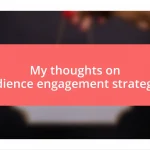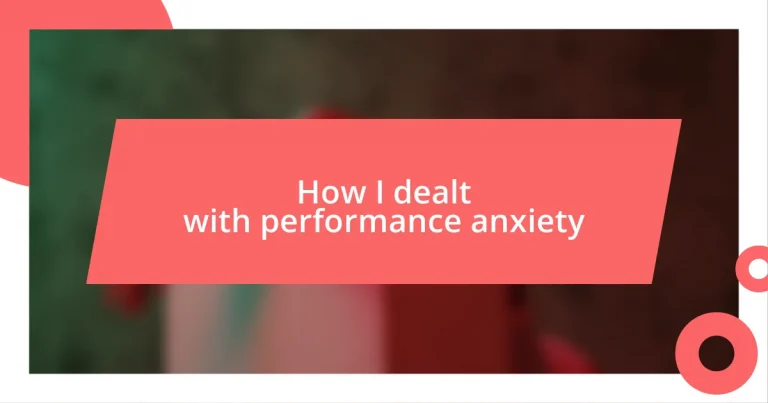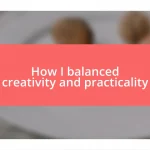Key takeaways:
- Identifying personal triggers for performance anxiety is crucial, as it allows for better preparation and management of feelings in high-stress situations.
- Techniques such as deep breathing, visualization, and grounding exercises can effectively help in managing anxiety and enhancing focus before performances.
- Seeking professional help, including therapy and support groups, can provide valuable tools and community support to navigate and alleviate performance anxiety.
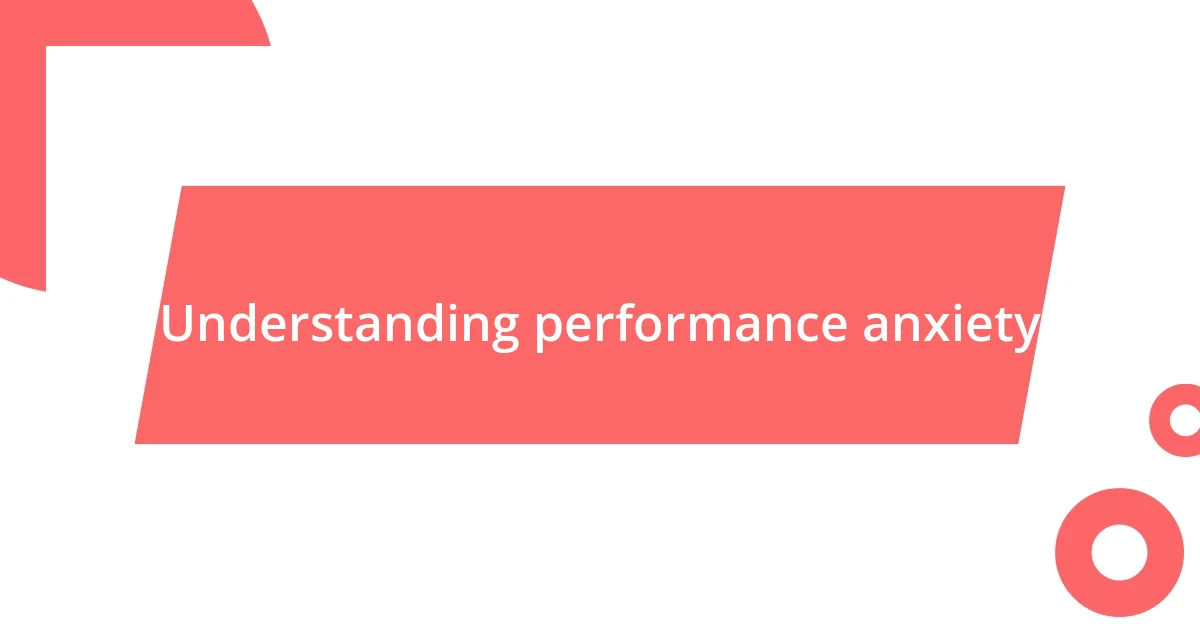
Understanding performance anxiety
Performance anxiety can feel like a weight pressing down on your chest. I remember standing on stage with a pounding heart, sweat trickling down my back, all while the spotlight felt like a scorching sun. It’s a unique blend of fear and self-doubt that many have experienced—suddenly, every eye is on you, and the fear of not meeting expectations can be overwhelming.
Have you ever felt your mind go blank just as you were about to deliver an important presentation? I’ve been there, caught in that moment where anxiety floods in, making it hard to think clearly. It’s interesting how our minds can create this cycle of fear, where past failures loom large, causing us to doubt ourselves despite our capabilities. Acknowledging this cycle is the first step in understanding performance anxiety and reclaiming control over it.
Often, what’s fascinating about performance anxiety is how it can manifest differently for everyone. For some, it might be a rapid heartbeat, while for others, it’s that insistent, nagging voice that says, “What if I mess up?” I found it helpful to pinpoint my own triggers—some situations feel more intimidating than others. By doing so, I began to recognize that performance anxiety is not just an adversary, but a common experience that many face, allowing me to approach it with more empathy towards myself and others.
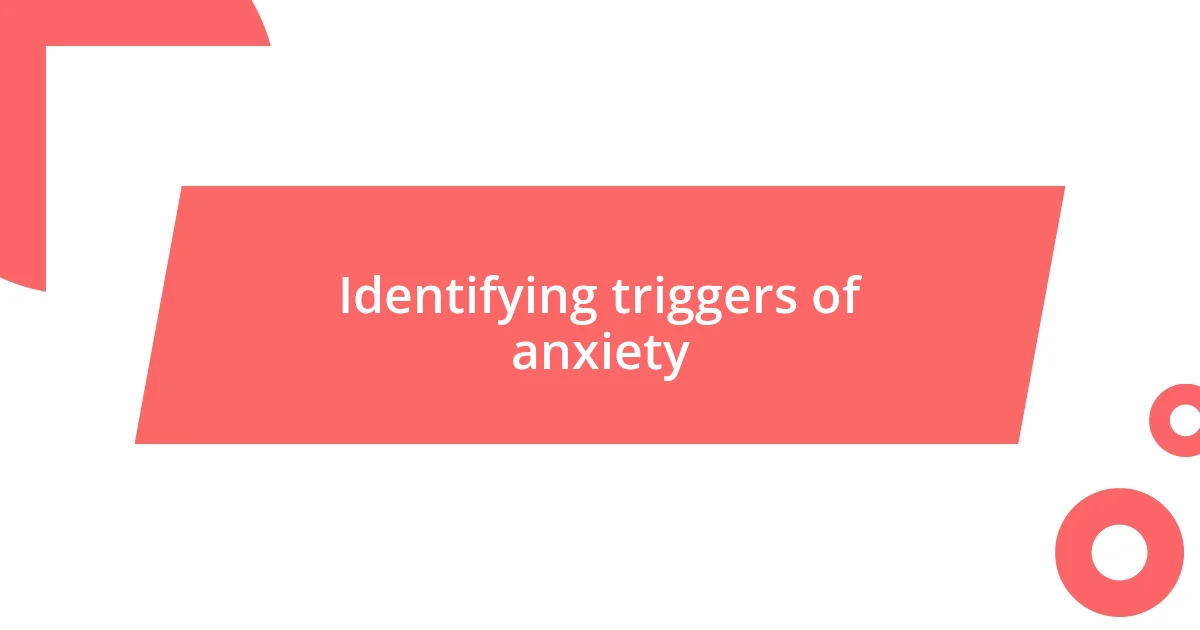
Identifying triggers of anxiety
Identifying my triggers for performance anxiety was a game-changer in managing my feelings. I realized that certain environments, like crowded rooms or high-stakes situations, made my anxiety skyrocket. The first time I figured this out was during a team meeting where I suddenly felt overwhelmed. I froze mid-sentence, and it became clear that the fear of judgment from colleagues was a significant trigger for me.
To help identify these anxiety triggers, I started paying close attention to the situations that made my heart race. Here’s what I found helpful:
- Public Speaking: I often felt the most anxious when presenting in front of a large audience.
- Critical Feedback: Anticipating criticism from others heightened my anxiety before even receiving it.
- Unknown Environments: New or unfamiliar settings made me feel vulnerable, leading to increased anxiety.
- High Stakes: Situations where I felt my reputation was on the line, like job interviews, were particularly triggering.
Understanding these specific triggers allowed me to prepare better and develop strategies that catered to each situation.
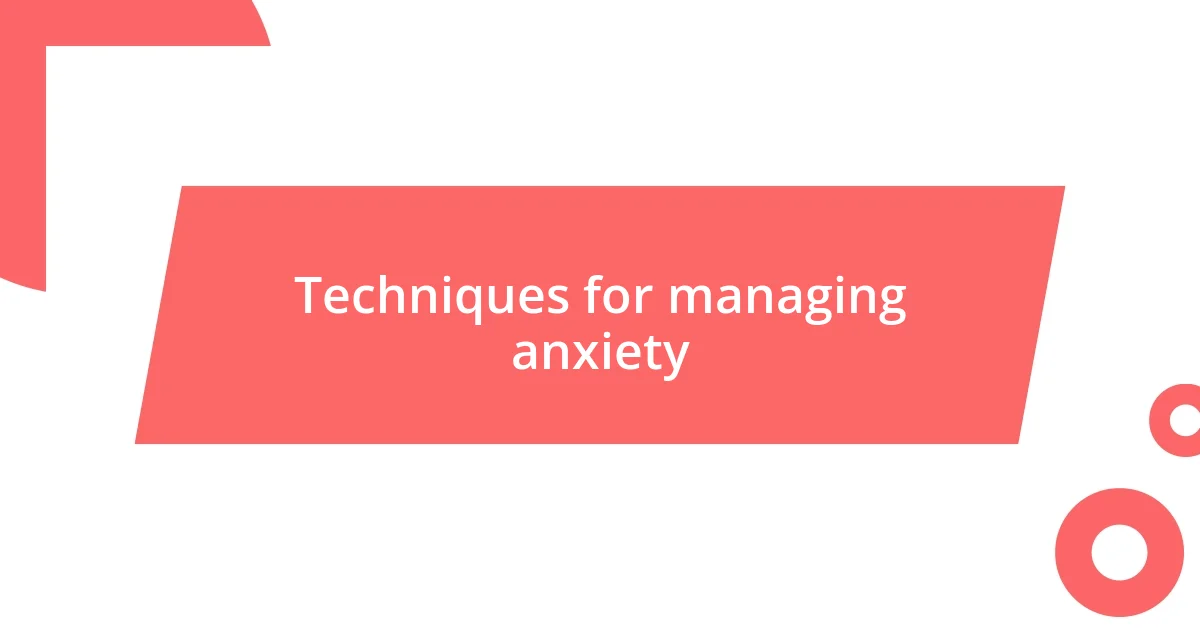
Techniques for managing anxiety
When it comes to managing anxiety, I discovered a few techniques that really made a difference for me. One was deep breathing exercises; they felt almost like a reset button for my racing thoughts. Just taking a few slow, deep breaths before going on stage shifted my focus and calmed the nerves. You’d be surprised how such a simple act can help bring a sense of control in moments that often feel chaotic.
Another technique that worked well for me was visualization. I started picturing myself succeeding before I stepped into any anxiety-inducing situation. I’d close my eyes and imagine the positive outcomes, the applause, or the smiles from my audience. This mental rehearsal helped create a sense of familiarity, almost like I had already been there and conquered my fear.
Finally, I can’t emphasize enough the power of grounding techniques during performance anxiety. When I felt my heart racing, I would look around and name five things I could see and four things I could touch. This simple practice helped pull me back to the present moment instead of spiraling into what-ifs. These techniques, when practiced regularly, became invaluable tools in my toolkit for navigating performance anxiety.
| Technique | Description |
|---|---|
| Deep Breathing | Helps calm racing thoughts and brings a sense of control. |
| Visualization | Mental rehearsal of success, creating familiarity with the situation. |
| Grounding Techniques | Focuses on the present moment to reduce overwhelming feelings. |
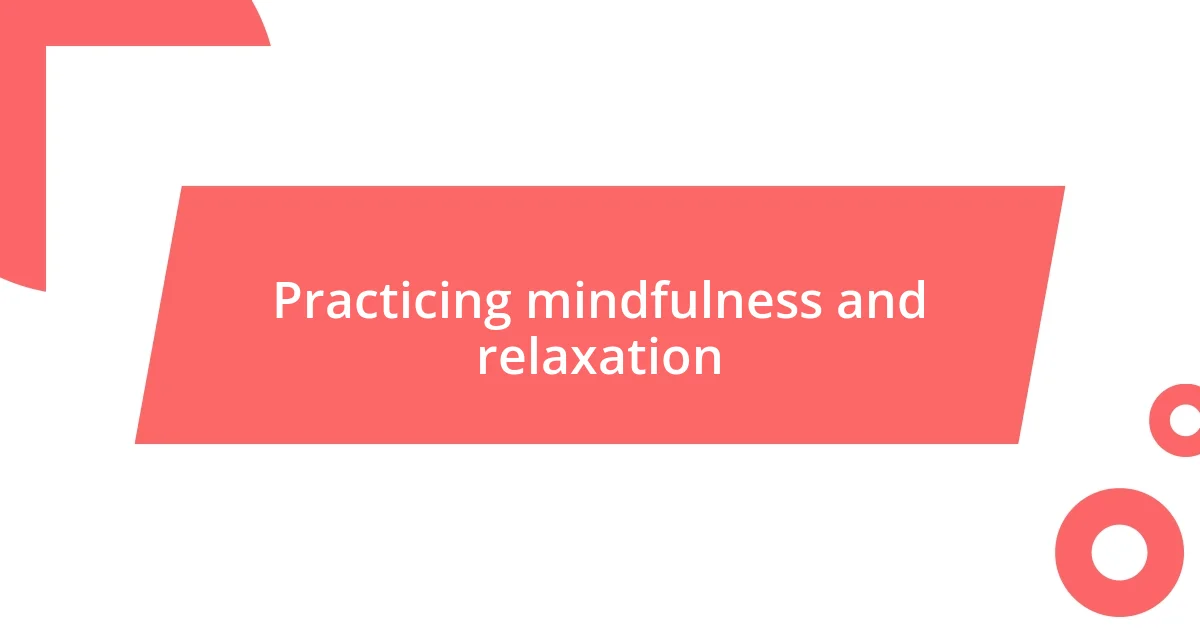
Practicing mindfulness and relaxation
Mindfulness and relaxation became essential parts of my journey to combat performance anxiety. One day, as I sat in a coffee shop, I noticed the chatter around me—the clinking of cups, the laughter, the urgent conversations. Instead of feeling anxious, I took a moment to focus on my breathing. Just inhaling deeply and letting the noise fade away transformed my perspective, almost as if a weight had lifted. Have you ever experienced that shift in focus? It’s empowering how quickly we can change our state of mind, simply by being present.
Incorporating mindfulness meditation into my routine provided me with a newfound sense of calm. On days I knew I faced potentially stressful situations, I took 10 minutes to sit silently and observe my thoughts, like clouds drifting by in a blue sky. I found that acknowledging my feelings without judgment made it easier to manage anxiety. I often reflect on how clarity in those moments taught me that feelings are temporary. What if you could view your anxiety as just another passing cloud instead of a storm?
I often combined these mindfulness practices with gentle stretching and yoga. There was a day in my living room when I felt particularly frazzled about an upcoming presentation. As I moved through a simple downward dog, I was surprised at how my body responded. Each stretch seemed to wash away a layer of tension, making room for confidence. Developing this connection between my body and mind was crucial. Have you ever tried something like that? Finding what works for you is part of the journey, and I encourage you to explore different methods until you discover your perfect blend of mindfulness and relaxation.
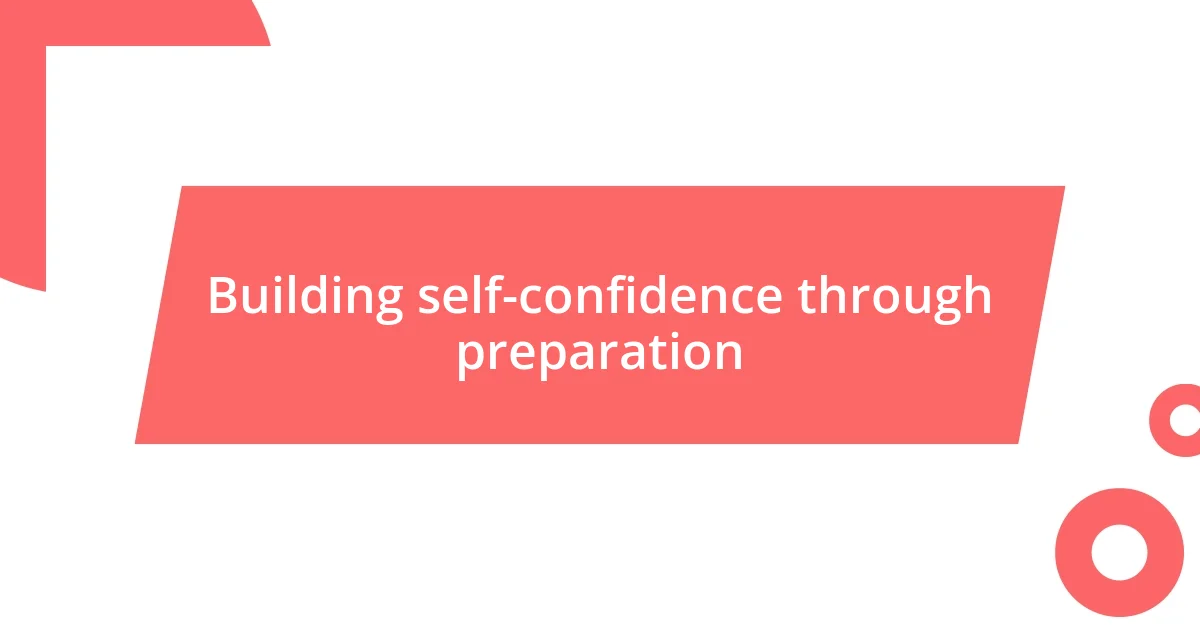
Building self-confidence through preparation
Building self-confidence through preparation is a game changer. I remember a time when I had a big presentation coming up, and I decided to break it down piece by piece. I created an outline, practiced in front of my mirror, and even recorded myself to fine-tune my delivery. That thorough preparation not only made me feel more in control but also transformed my nerves into excitement. Have you ever noticed how knowing your material like the back of your hand can bolster your confidence and ease your anxieties?
Furthermore, I made a habit of anticipating questions from my audience. Just thinking through potential inquiries helped me feel more equipped to handle whatever came my way. I recall one specific encounter where someone asked a challenging question, but instead of freezing, I confidently gave a well-thought-out response. That moment taught me how preparation could turn apprehension into assurance, allowing me to embrace unexpected scenarios. How often do you think ahead in your own preparations?
I’ve also found that practicing in a supportive environment was invaluable. I gathered friends who acted as my audience, offering constructive feedback. This process turned what once felt daunting into something familiar and safe. It’s incredible how having that kind of support can transform your anxiety into a shared experience. When was the last time you sought out feedback like this? I genuinely believe that preparation not only builds your knowledge but also fosters connection, making you more resilient in the face of performance anxiety.
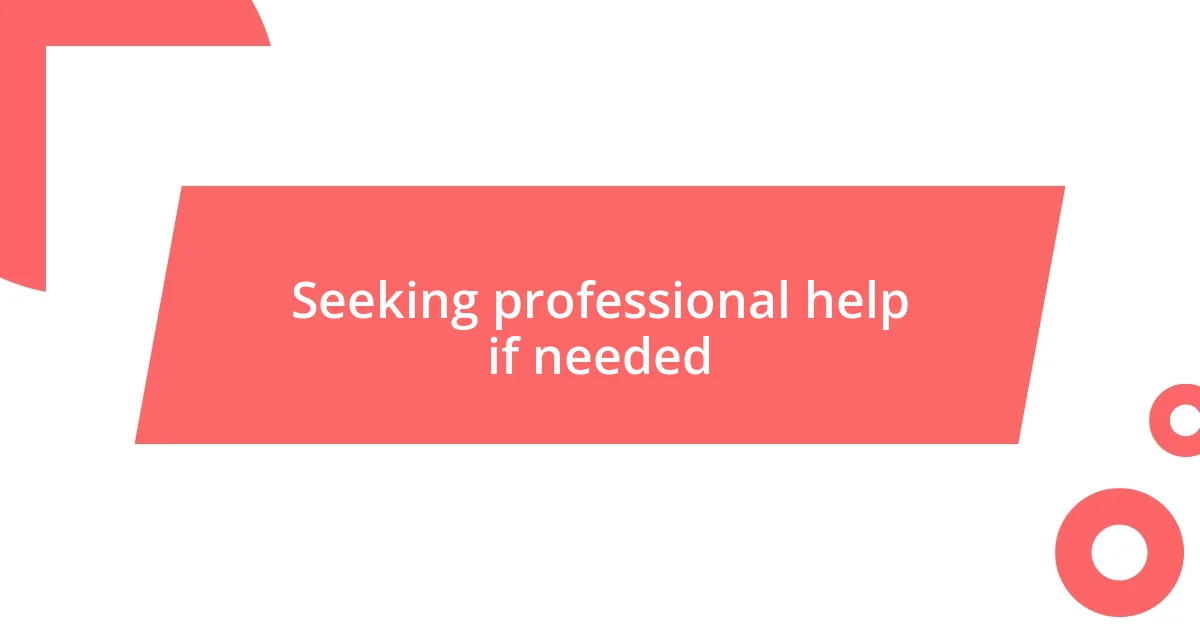
Seeking professional help if needed
Seeking professional help when performance anxiety becomes overwhelming can be a pivotal step in addressing the issue effectively. I remember grappling with persistent anxiety that left me feeling trapped, and finally reaching out to a therapist was a breath of fresh air. Opening up about my experiences in a safe environment allowed me to gain valuable insights—and it certainly was a relief to know I wasn’t alone in this struggle. Have you ever considered how talking to someone trained in these matters might provide new perspectives?
Therapy equipped me with tools and techniques that complemented my mindfulness practices. I learned about cognitive behavioral therapy, which helps reframe negative thought patterns that can fuel anxiety. The first time I implemented these strategies, I felt a shift in how I responded to stressful situations. Instead of spiraling into panic, I began to challenge those negative thoughts. It was fascinating to discover how a simple shift in perception could empower me to handle anxiety more effectively. Have you thought about how changing your mindset could alter your approach to performance?
Additionally, support groups were incredibly helpful in my journey. Sharing experiences with individuals facing similar challenges created a sense of community. One memorable session stands out; we collectively discussed our worst performance moments and found humor amidst the nerves. This camaraderie fostered understanding and reminded me that vulnerability can be a source of strength. Have you ever experienced that feeling of comfort in shared struggles? Engaging with others not only provided emotional relief but also opened doors to new coping strategies that I hadn’t yet considered.








